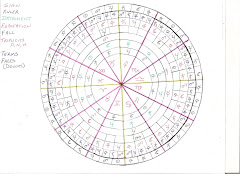Mnemonic for Middle Egyptian Alphabet
The vulture from the reed leaf flew
And landed on the reed leaf two
The arm which reached the quail chick's foot
Then reached a stool and on it put
A horned viper!
The owl above the water swooped
It's mouth as an enclosure drooped
And dropped the rope - a big descenta!
Upon the floating there placenta.
Animal bellies and bolts of doors
And folded cloth may be in stores
But pools and hills and basket lands
Are seldom far from old jar-stands.
A loaf of bread is not a hobble
A hand can't make a cobra bobble!
Julius Firmicus Maternus was a Christian Latin writer and notable astrologer, who lived in the reign of Constantine I and his successors.
Life and works
He was also a Sicilian lawyer from upper nobility; his manuscripts include titles indicating the Senatorial order. Author of Matheseos Libri Octo ("Eight Books of Astrology", c. 330) and De errore profanarum religionum ("On the error of profane religions"). The lunar crater Firmicus was named in his honor.
About the year 346 he composed a work entitled , which he dedicated to Constantius II and Constans, the sons of Constantine, and which is still extant. He holds up to scorn the religious beliefs and practices of pagans and implores the Emperor to stamp out the old religions as a sacred duty which will be rewarded by God. In the first part (chs. 1‑17) he attacks the false objects of worship among the Oriental cults; in the second (chs. 18‑29) he discusses a number of formulae and rites connected with the mysteries.
De errore profanarum religionum provides such a sharp contrast with Firmicus' book on astrology (commonly referred to as the Mathesis), that the two works have sometimes been attributed to different writers. However, Theodor Mommsen has shown that the Mathesis was composed in the year 336 and not in 354 as was formerly held, thus making it an earlier work than De errore profanarum religionum, which could have been written prior to Firmicus' conversion to Christianity. When we add to this the similarity of style, and the fact that each betrays a connection with Sicily, this provides compelling evidence that the same author wrote both books.
The Christian work, "On The Error of Profane Religions", is preserved in a Palatine manuscript in the Vatican library. It was first printed at Strassburg in 1562, and has been reprinted several times, both separately and along with the writings of Minucius Felix, Cyprian or Arnobius. The Neoplatonist work was first printed by Aldus Manutius in 1501, and has often been reprinted.


No comments:
Post a Comment